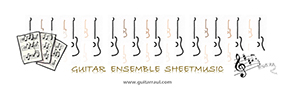It can be said that Heitor Villa-Lobos, Frank Martin, and Benjamin Britten all have a musical aesthetic premised on tonal unity; however, each of these composers subvert the security of a homogenous tonal syntax by placingmechanisms of conflict into their musical language. This integration of chronologically distant musical structures brings about a conflict between old and new, and it is this conflict that is vital to all of the music examined in this study. When the coexistence of old and new structuresis irreconcilable, the analytical approach taken is tailored to address this conflict as a continual disunity. However, the coexistence of chronologically distant structuresmay also be ameliorated as well, through analytical approaches that, in some respects, unite elements of old and new.
Examined herein are Villa-Lobos’s Études Nos. 1 and 12, and Préludes Nos. 2 and 3, from Twelve Étudesfor Guitar (1929) and Cinq Préludes for Guitar(1940), Martin’s first and fourth movements from Quatre Pièce Brèves(1933), and Britten’s first movement from Nocturnal after John Dowland (1963). In an effortto unlock thestructural imperatives of thesethree composers, this study follows the lead of other analysts dealing with similar musical settings and adopts an approach that allows tonal interpreters to express components that contribute to a traditionaltonal reading without asserting that all components so contribute, while,conversely, allowing post-tonal analytical strategies to
express nontraditional components without asserting the work is atonal.
The evaluation of elements of conflict is aided by this study’s chief organizationalsystem: that of hierarchical organization, and sincethe musical structures are both tonal and post-tonal, both prolongationaland associational modelsare considered.Further aiding the investigation of conflicting musical structure is Joseph Straus’s notion of “misreading,” herein defined as a transformationor recomposition of salient aspects of traditional tonal music.
Thomas Robert Becker https://kuscholarworks.ku.edu





